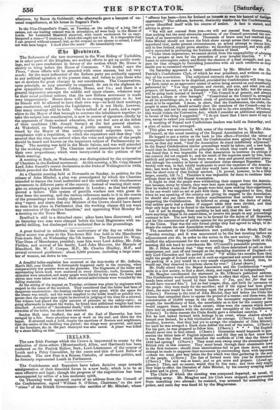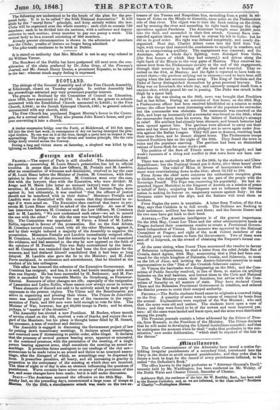IRELAND.
The new Irish Peerage which the Crown is impowered to create by the extinction of three others (Mountsanford, Allen, and Hartland) has been conferred on Sir Patrick Bellew, Bart., Lord-Lieutenant of the county of Louth and a Privy Councillor, by the name and title of Lord Bellew of Barneath. The new Peer is a Roman Catholic, of moderate politics, and he formerly represented Louth in Parliament.
The Confederates and Repealers have taken decisive steps towards amalgamation of their disunited forces in a new body, which is to be at once effective and legal; though the progress of the negotiations has been accompanied by sallies of a less moderate spirit. On Thursday week appeared copies of an address from the Council of the Confederation, signed "William S. O'Brien Chairman," on the new " crime " of the British Government—the sacrifice of Mr. Mitchel; whose " offence has been—love for Ireland as intense as was his hatred of fix;ign oppression." The address, however, distinctly marks that the Confedenttion never identified itself with his course of action. A fact is stated, and advice is given- " We will not conceal from you—we will not conceal from Government, that nothing. but the most strenuous exertions of our Council prevented the out- break of an insurrection last week. Thousands of brave men had resolved that John Mitchel should not leave the Irish shore except across their corpses. We apprehend that, under present circumstances, an armed attempt to rescue him, and to free Ireland, might prove abortive: we therefore interposed, and with diffl.
culty succeeded in preventing the fruitless effusion of blood. • • *
" Under these impressions, we cannot shrink from the responsibility of adviajug you to prepare at once for the protection of your invades' liberties. • * Learn to contemplate calmly and firmly the chances of a final struggle, and pre.. pare for that struggle by furnishing yourselves with all such resources as may enable you to command success." On Saturday appeared a letter addressed by Mr. Mitchel to the St. Patrick's Confederate Club, of which he was president, and written on the day of his conviction. The subjoined extracts show its spirit- " There is no reason to be dispirited, provided the Confederation will from this day forth insist on an aggressive course of action being entered on and steadfastly persevered in." " You may organize, and recruit, and arm, and what you ma prepare, till harvest, or till an European war, or till the sky falls; but the cause will be going back instead of forward." " The Council is at present, and always has been, a clique or close borough." "Constituted as the Council is, arranged as all its proceedings are, in a select circle of gentlemen, no bold forward move- ment is to be expected. I mean, in short, that the Confederates, the clubs, the people in some form, should actually elect the members of the Council—say for six months, and not by any means suffer it to add to its own numbers. Of course, this would violate the Convention Act; which I consider an additional argument in favour of the thing I suggested." " I do not know that I have more to say to you, except to exhort you earnestly to go on." A meeting of Repeal and Confederate leaders was held on Saturday, and a plan of union was arranged.
This plan was announced, with some of the reasons for it, by Mr. John O'Connell, at the usual meeting of the Repeal Association on Monday. He begged to put a notice on the book to this effect—Provided the terms of arrangement between that body and the Confederation were agreed to, he would move, on that day week, "that the Association do stand indefinitely adjourned." In the Repeal Confederation similar proceedings would be taken; and a new body would then be formed, founded on principles to which they could all assent. It was found that it was impossible for that Association to continue its sittings if the country did not support it; and the result of the inquiries made by him, both publicly and privately, was, that there was a deep and general sentiment preva- lent through the country in favour of immediate union amongst Repealers. The weekly rent was, in fact, totally inadequate to meet the expenses of the Associa- tion; last week it was but 121, and they would have to announce on that day a sum far short even of that limited amount. [It proved, however, to be a little larger, namely, 1317s.] Therefore it was impossible for them to continue their sittings there as the Old Repeal Association. It might be that the people were withholding their support from the Associa- tion because, stung by misery, they were bent upon making another experiment. Now he wished to say, that if the people were bent upon making that experiment, he for one would take no act or part with them. It was suggested to him, that when he was speaking of the country not giving its support to the Association, he should also say there were distinct manifestations that neither were they supporting the Confederation. He believed so strong was the desire of union, that neither party had a chance of support while they were divided, and that their only hope was to be found in the formation of this new body.
Let it not be thought, from anything he had said, that the new body would have anything illegal in its constitution, or involve the people in any proceedings contrary to law. The new body was to be formed for the union of all Repealers, and for the concentration of public opinion for the purpose of obtaining the repeal of the Union. That was the only formal pledge they had agreed to adopt, to in- dicate the course the new Association would take.
The members of the Confederation met publicly in the Music Hall on Tuesday evening; and it was announced to be the last meeting before an adjournment sine die, in order to the union in the new society: Mr. Duffy notified the adjournment for the next meeting. The language held at this meeting did not tend to corroborate Mr. O'Connell's peaceable promises.
Mr. J. Dillon declared that " they were still there determined to call on their countrymen and cast off and trample on the degrading dominion of England—to defy Lord Clarendon and his packed juries." "If within two months from that night the people of Ireland were not in such an organized and armed position that the packing of a jury would be a very unsafe experiment in Ireland, then, he would say, they deserved to continue slaves for ever." (Loud cheers.) Mr. Duffy stated that the Repeal Association and the Confederation "would unite in a new society, to find a short, sharp, and rapid road to independence."
Mr. Meagher corroborated the statement in Mr. O'Brien's published address. The Confederates would certainly have fought to effect that object, had not their hands been seized and bound by their leaders. ('. Yes, yes; but for that we would have rescued him.") Let no foul tongue, then, spit forth its sarcasms on the people: they were ready for the sacrifice; and if the signal had been given them, the stars would be now burning upon the graves of a thousand martyrs. (Cheers.) Previous to the trial of John Mitchel, they laid before the Clubs the reasons that compelled them to oppose the project of a rescue; and these were the concentration of 10,000 troops in the city, the incomplete organization of! the people, the insufficiency of food, the uncertainty as to how far the country parts would support them, and to what extent; these were the reasons which drove them into an antagonism with the devotion and intrepidity of the Confederates. (Cheers.) To these reasons the Clubs finally gave a reluctant sanction. • • * But he now looked forward with feelings to an event, whose shadow already loomed over Ireland, for a full vindication of his courage. (Cheers.) Let them recollect, however, that they had yet to avenge the treatment of John Mitchel; for until he was avenged a black stain defiled the soul of the nation. (Cheers) For his part, he was prepared to follow him. (Cheers.) • * The English should never rest in that island. (Cheers.) Generation would bequeath to gen- eration the bitter hate of English injustice; and did they not in fact Know that it was from the blood which drenched the scaffolds of 1798 that the felons of 1848 had sprung ? (Cheers.) They must soon sweep away the abominations of British rule in this country. They must break through their abominable laws in the first instance: should these abominations fail to put them down, and an attempt be made to suppress their movement by surrounding them with bayonets —these too must give way before the fire which was then gathering in the soul of the people. (Cheers.) The fate of Ireland must this year be determined. (Cheers.) The end was at hand; and so get arms and prepare. (Loud ap- plause.) Then, and no sooner, would they be free men; and thus only might they hope to effect the liberation of John Mitchel, by his country arraying itself in arms and in glory. (Cheers.) The Clubs of which the meeting was composed departed, as usual, in marching array. Mr. Meagher and his Club were stopped, and prevented from marching two abreast: he resisted, was arrested for assaulting the police, and next day was fined 51. by the Magistrates. The following are understood to be the heads of the plan for the pro- posed body. It is to be called " the Irish National Association." It will abide by the "moral force" principle, and keep strictly within the law. Clubs will be organized over the whole country; each club to contain 720 members; each to be divided into six sections, with a collector and deputy collector to each section; every member to pay one penny a week. The central body to be a council consisting of 300 members.
Already greater circumspection is shown in the admission of members into the Clubs; youths of sixteen no longer being admitted. The pike-trade continues to be brisk in Dublin.
It is stated on authority that Mrs. Mitchel is not in any way related to Sir William Verner.
The Benchers of the Dublin bar have postponed till next term the con- sideration of the claim preferred by Dr. John Gray, of the Freeman's journal, and Mr. Joseph Henry Dunne, a prominent Repealer, to be called to the bar: whereat much angry feeling is expressed.



























 Previous page
Previous page